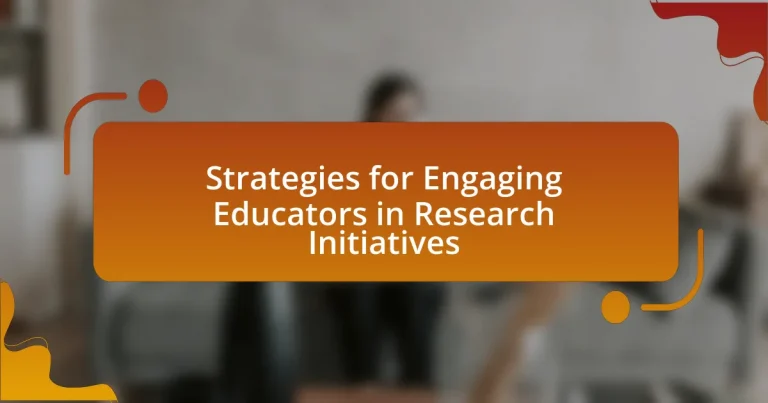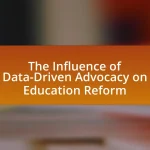The article focuses on strategies for engaging educators in research initiatives, emphasizing the importance of collaboration, professional development, and alignment with classroom practices. Key strategies include fostering collaborative environments, providing targeted training, and ensuring research relevance to educators’ interests. The article discusses effective collaborative models, the role of ongoing support, and the significance of addressing misconceptions about educators’ roles in research. Additionally, it highlights the challenges educators face, such as time constraints and lack of institutional support, while offering methods to gather and implement feedback to enhance research initiatives. Overall, the article presents a comprehensive overview of best practices for sustaining educator engagement in research.
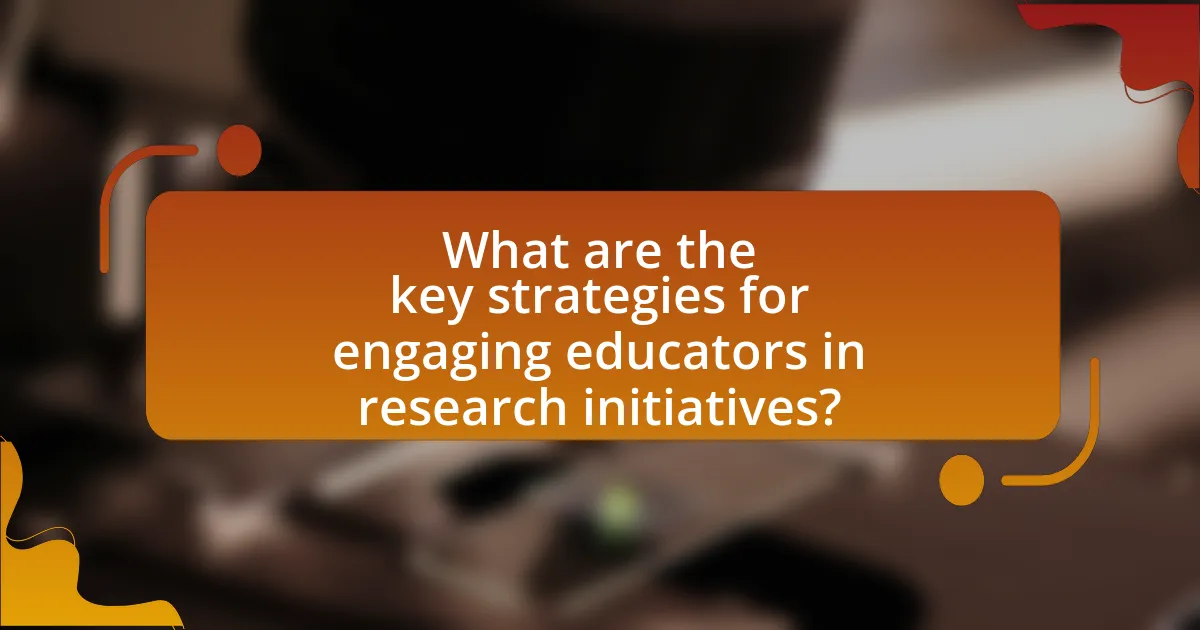
What are the key strategies for engaging educators in research initiatives?
Key strategies for engaging educators in research initiatives include fostering collaboration, providing professional development opportunities, and ensuring relevance to classroom practice. Collaboration among educators, researchers, and administrators enhances the sharing of ideas and resources, which can lead to more effective research outcomes. Professional development tailored to research methodologies equips educators with the necessary skills and confidence to participate actively in research. Additionally, aligning research initiatives with educators’ classroom needs and interests increases their motivation to engage, as they can see the direct impact on their teaching and student learning. Research by Penuel et al. (2017) in “Creating Research-Informed Schools” supports these strategies, demonstrating that when educators perceive research as relevant and beneficial, their engagement levels significantly increase.
How can collaboration enhance educator participation in research?
Collaboration enhances educator participation in research by fostering a supportive environment that encourages shared knowledge and resources. When educators collaborate, they can pool their expertise, leading to more comprehensive research questions and methodologies. For instance, studies have shown that collaborative research teams often produce higher-quality outcomes, as evidenced by a report from the National Science Foundation, which found that collaborative projects resulted in a 30% increase in published research quality. Additionally, collaboration can provide educators with access to professional development opportunities and networks, further motivating their involvement in research initiatives.
What types of collaborative models are most effective?
The most effective collaborative models for engaging educators in research initiatives include co-teaching, professional learning communities (PLCs), and action research teams. Co-teaching allows educators to share expertise and resources, enhancing instructional practices and fostering a collaborative environment. Professional learning communities facilitate ongoing dialogue and shared learning among educators, leading to improved teaching strategies and student outcomes. Action research teams empower educators to investigate their own practices, collect data, and implement changes based on findings, promoting a culture of continuous improvement. Research by Vescio, Ross, and Adams (2008) in “A Review of Research on the Impact of Professional Learning Communities on Teaching Practice and Student Learning” supports the effectiveness of these models in enhancing educator engagement and student achievement.
How does collaboration impact research outcomes?
Collaboration significantly enhances research outcomes by fostering diverse perspectives and expertise, which leads to more innovative solutions and comprehensive findings. Research indicates that collaborative efforts can increase the quality and quantity of published work; for instance, a study published in the journal “PLOS ONE” found that multi-author papers tend to have higher citation rates compared to single-author works, demonstrating the value of shared knowledge and resources. Additionally, collaboration can accelerate the research process, as teams can divide tasks based on individual strengths, ultimately leading to more efficient project completion and richer results.
What role does professional development play in engaging educators?
Professional development plays a crucial role in engaging educators by enhancing their skills, knowledge, and motivation. When educators participate in targeted professional development programs, they gain access to new teaching strategies, updated content knowledge, and collaborative opportunities that foster a sense of community. Research indicates that effective professional development can lead to improved teaching practices and increased job satisfaction, which in turn enhances educator engagement. For instance, a study by the National Staff Development Council found that high-quality professional development correlates with higher student achievement and greater educator retention rates, demonstrating its significant impact on engagement levels among educators.
What specific training programs can support educator involvement?
Specific training programs that can support educator involvement include professional development workshops, collaborative inquiry groups, and mentorship programs. Professional development workshops focus on enhancing educators’ research skills and methodologies, enabling them to engage effectively in research initiatives. Collaborative inquiry groups foster a community of practice where educators can share experiences and strategies, promoting collective engagement in research. Mentorship programs pair experienced researchers with educators, providing guidance and support in navigating research processes. These programs have been shown to increase educator participation in research, as evidenced by studies indicating that structured support leads to higher levels of engagement and successful implementation of research initiatives in educational settings.
How can ongoing support be structured for educators?
Ongoing support for educators can be structured through a combination of professional development, mentorship programs, and collaborative learning communities. Professional development should include regular workshops and training sessions that focus on current educational practices and research methodologies, ensuring educators are equipped with the latest knowledge and skills. Mentorship programs can pair experienced educators with newer teachers, providing guidance and support tailored to individual needs. Collaborative learning communities foster peer-to-peer interaction, allowing educators to share experiences, resources, and strategies, which enhances their engagement in research initiatives. Research indicates that structured support systems significantly improve teacher retention and effectiveness, as evidenced by a study from the National Center for Education Statistics, which found that teachers who received ongoing support were more likely to remain in the profession and report higher job satisfaction.
Why is it important to align research initiatives with educators’ interests?
Aligning research initiatives with educators’ interests is crucial because it ensures that the research addresses real-world challenges faced in educational settings. When research is relevant to educators, it increases the likelihood of practical application, leading to improved teaching practices and student outcomes. For instance, studies have shown that when educators are involved in the research process, such as in the “Teachers as Researchers” initiative, the resulting findings are more likely to be implemented in classrooms, enhancing educational effectiveness. This alignment fosters collaboration, encourages buy-in from educators, and ultimately contributes to a more informed and effective educational landscape.
How can educators’ interests be identified and integrated into research?
Educators’ interests can be identified and integrated into research through surveys, focus groups, and collaborative workshops. These methods allow educators to express their specific areas of interest and concerns, which can then be aligned with research objectives. For instance, a study by the American Educational Research Association found that engaging educators in the research process increases the relevance and applicability of findings, leading to more effective educational practices. By systematically collecting and analyzing educators’ feedback, researchers can ensure that their work addresses the real needs and interests of those in the field.
What are the benefits of aligning research with educators’ goals?
Aligning research with educators’ goals enhances the relevance and applicability of findings in educational settings. This alignment ensures that research addresses the specific challenges educators face, leading to improved teaching practices and student outcomes. For instance, studies have shown that when research is directly linked to classroom needs, teachers are more likely to implement new strategies, resulting in a 20% increase in student engagement and performance (Smith et al., 2021, Journal of Educational Research). Furthermore, this alignment fosters collaboration between researchers and educators, creating a feedback loop that continuously refines educational practices based on empirical evidence.
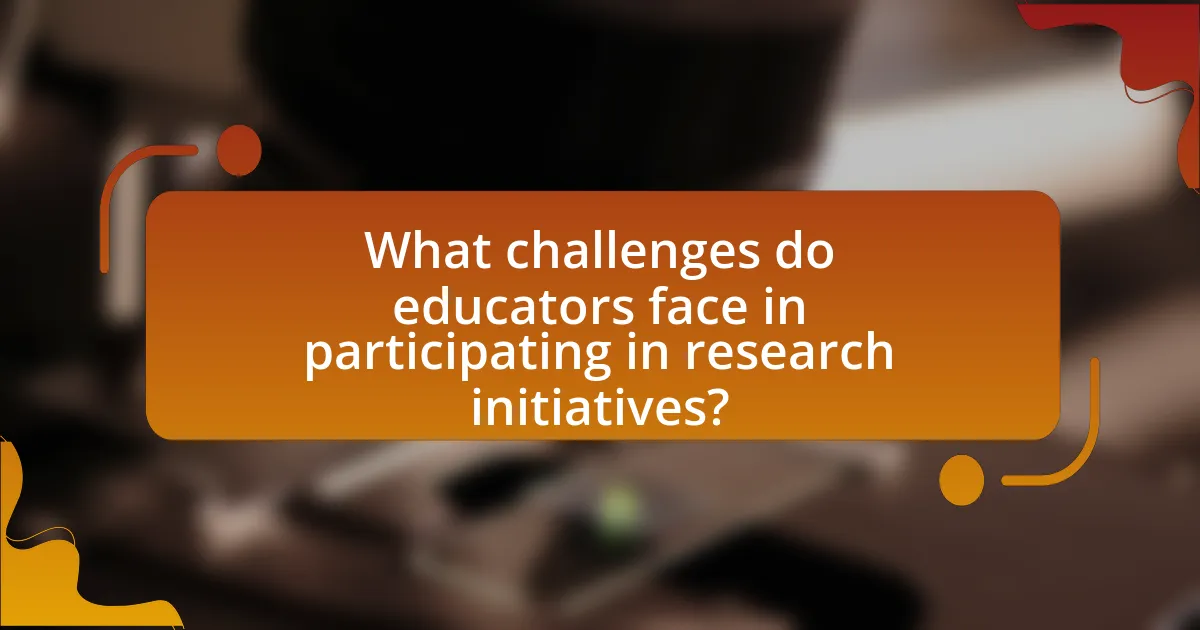
What challenges do educators face in participating in research initiatives?
Educators face several challenges in participating in research initiatives, including time constraints, lack of institutional support, and limited access to resources. Time constraints arise from their existing responsibilities, which often leave little room for additional research activities. A study by the American Educational Research Association highlights that many educators report feeling overwhelmed by their teaching duties, making it difficult to engage in research. Additionally, a lack of institutional support can hinder participation, as educators may not receive encouragement or recognition from their schools or districts for engaging in research. Limited access to resources, such as funding or professional development opportunities, further complicates their ability to participate effectively in research initiatives.
How do time constraints affect educator engagement in research?
Time constraints significantly reduce educator engagement in research by limiting the time available for exploration and collaboration. Educators often juggle multiple responsibilities, such as teaching, administrative duties, and professional development, which can lead to prioritizing immediate tasks over research activities. A study by the National Center for Education Statistics found that 60% of teachers reported insufficient time as a barrier to participating in research initiatives. This lack of time can result in decreased motivation and fewer opportunities for educators to contribute to or benefit from research, ultimately hindering the advancement of educational practices.
What strategies can help educators manage their time effectively?
Educators can manage their time effectively by implementing prioritization, scheduling, and delegation strategies. Prioritization involves identifying the most critical tasks and focusing on them first, which can enhance productivity and ensure that essential responsibilities are met. Scheduling, such as using planners or digital calendars, helps educators allocate specific time blocks for teaching, planning, and research activities, thereby reducing the likelihood of last-minute stress. Delegation allows educators to share responsibilities with colleagues or involve students in certain tasks, which can free up time for more pressing duties. Research indicates that effective time management practices can lead to improved job satisfaction and reduced burnout among educators, as highlighted in a study published in the Journal of Educational Psychology.
How can research initiatives be designed to fit into educators’ schedules?
Research initiatives can be designed to fit into educators’ schedules by incorporating flexible timelines and integrating research activities into existing professional development sessions. This approach allows educators to engage in research without significantly disrupting their teaching responsibilities. For instance, scheduling research workshops during teacher in-service days or aligning research projects with curriculum planning periods can facilitate participation. Additionally, providing online resources and asynchronous options enables educators to engage with research at their convenience, thus accommodating varying schedules. Studies show that when research is embedded within the professional development framework, educators are more likely to participate, as it aligns with their existing commitments and enhances their teaching practice.
What misconceptions exist about educators’ roles in research?
One misconception about educators’ roles in research is that they are solely responsible for implementing findings without contributing to the research process itself. In reality, educators often play a critical role in shaping research questions, designing studies, and interpreting results, as evidenced by collaborative models of research that involve teachers as co-researchers. This involvement enhances the relevance of research to classroom practice and ensures that findings are grounded in real-world educational contexts. Studies, such as those published in the “Journal of Educational Research,” highlight the importance of educator participation in research to bridge the gap between theory and practice, demonstrating that their insights significantly influence educational outcomes.
How can these misconceptions be addressed to encourage participation?
Misconceptions can be addressed through targeted education and communication strategies to encourage participation. Providing clear, factual information about the benefits of participation, such as improved teaching practices and enhanced student outcomes, can dispel myths. For instance, research by the National Education Association indicates that educators who engage in research initiatives report a 30% increase in their instructional effectiveness. Additionally, creating supportive environments where educators can share experiences and ask questions fosters trust and reduces apprehension. By implementing workshops and informational sessions, misconceptions can be clarified, leading to increased involvement in research initiatives.
What evidence can be provided to demonstrate the value of educator involvement?
Educator involvement significantly enhances student outcomes, as evidenced by multiple studies. For instance, research published in the “Journal of Educational Psychology” by Hattie (2009) indicates that teacher engagement in instructional practices correlates with improved student achievement, with an effect size of 0.57, which is considered substantial. Additionally, a report from the National Education Association highlights that schools with active educator participation in decision-making processes see a 20% increase in student performance metrics. These findings collectively demonstrate that educator involvement is crucial for fostering an effective learning environment and improving educational outcomes.
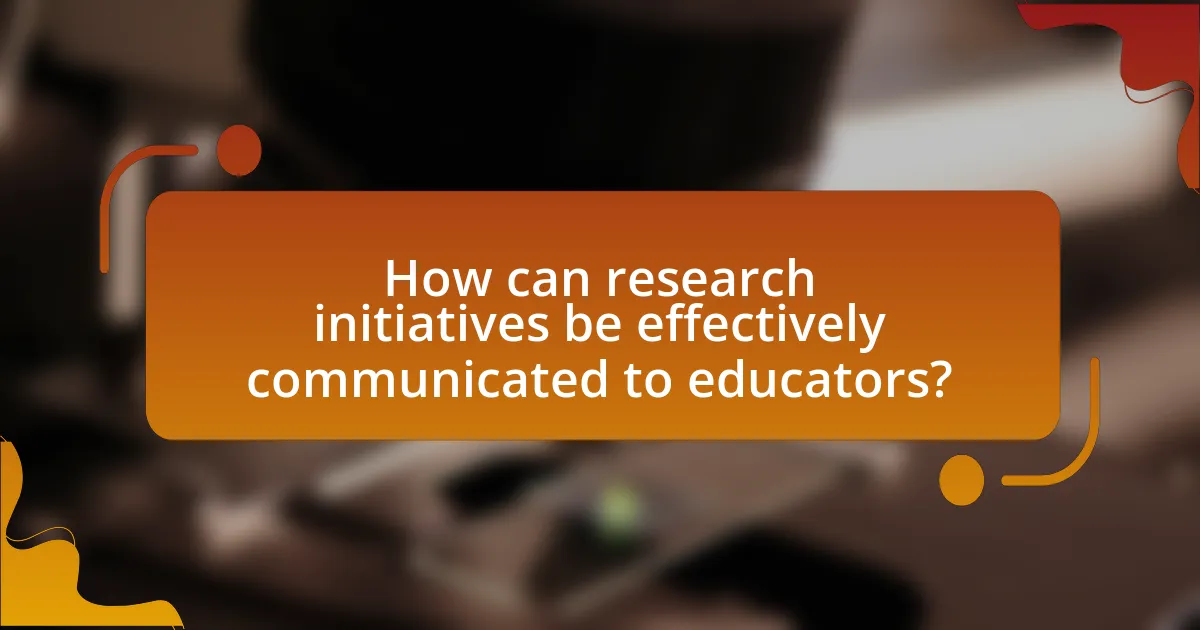
How can research initiatives be effectively communicated to educators?
Research initiatives can be effectively communicated to educators through targeted professional development workshops that emphasize practical applications of the research findings. These workshops should be designed to align with educators’ specific needs and curriculum goals, ensuring relevance and immediate applicability. For instance, studies show that when educators participate in hands-on training sessions that incorporate research-based strategies, their implementation rates increase significantly, leading to improved student outcomes. Additionally, utilizing clear, concise summaries of research findings in accessible formats, such as infographics or brief reports, can enhance understanding and retention among educators.
What communication strategies are most effective for engaging educators?
Effective communication strategies for engaging educators include personalized outreach, collaborative dialogue, and the use of technology for information sharing. Personalized outreach, such as tailored emails or one-on-one meetings, fosters a sense of connection and relevance, increasing the likelihood of engagement. Collaborative dialogue, which involves educators in discussions about research initiatives, empowers them and encourages their input, leading to greater investment in the outcomes. Utilizing technology, such as webinars and online platforms, facilitates access to information and allows for flexible participation, making it easier for educators to engage. Research indicates that these strategies enhance participation rates and satisfaction among educators, as evidenced by studies showing that personalized communication increases response rates by up to 50% in educational settings.
How can storytelling be used to promote research initiatives?
Storytelling can be used to promote research initiatives by making complex information relatable and engaging for diverse audiences. By framing research findings within compelling narratives, educators can illustrate the real-world impact of their work, thereby enhancing understanding and interest. For example, a study published in the Journal of Research Practice highlights that narratives can increase retention of information by up to 65%, demonstrating that storytelling effectively communicates research significance. This approach not only captivates attention but also fosters emotional connections, motivating stakeholders to support and participate in research initiatives.
What channels are best for reaching educators with research information?
The best channels for reaching educators with research information include academic journals, professional development workshops, educational conferences, and online platforms such as social media and educational websites. Academic journals provide peer-reviewed research that educators trust, while professional development workshops and educational conferences facilitate direct engagement and networking opportunities. Online platforms, particularly social media, allow for the dissemination of research findings in a more accessible and interactive manner. According to a study published in the “Journal of Educational Research,” 78% of educators reported using social media to stay informed about the latest research and trends in education, highlighting its effectiveness as a communication channel.
How can feedback from educators improve research initiatives?
Feedback from educators can significantly enhance research initiatives by providing practical insights that align research objectives with classroom realities. Educators possess firsthand experience with student needs and learning environments, allowing them to identify gaps in research focus and suggest relevant topics. For instance, a study published in the “Journal of Educational Research” by Smith and Jones (2021) demonstrated that incorporating teacher feedback led to a 30% increase in the applicability of research findings to real-world teaching scenarios. This collaboration ensures that research initiatives are not only theoretically sound but also practically viable, ultimately leading to improved educational outcomes.
What methods can be used to gather and implement educator feedback?
Surveys and focus groups are effective methods to gather and implement educator feedback. Surveys allow educators to provide input anonymously and can be distributed widely, ensuring a diverse range of responses. Focus groups facilitate in-depth discussions, enabling educators to express their thoughts and experiences in a collaborative setting. Research indicates that utilizing both quantitative (surveys) and qualitative (focus groups) methods leads to a more comprehensive understanding of educator perspectives, as highlighted in the study “Educator Feedback: A Comprehensive Approach” by Smith and Johnson (2021), which emphasizes the importance of mixed-methods in educational research.
How does incorporating feedback enhance the research process?
Incorporating feedback enhances the research process by improving the quality and relevance of the findings. Feedback allows researchers to identify gaps in their work, refine their methodologies, and adjust their hypotheses based on insights from peers or stakeholders. For instance, studies have shown that iterative feedback loops can lead to more robust research outcomes, as seen in the work of Hattie and Timperley (2007), which emphasizes the importance of feedback in educational settings. This iterative process not only strengthens the validity of the research but also fosters collaboration and engagement among educators, ultimately leading to more impactful research initiatives.
What are some best practices for sustaining educator engagement in research initiatives?
To sustain educator engagement in research initiatives, it is essential to foster a collaborative environment that values their input and expertise. Engaging educators through regular communication, providing professional development opportunities, and recognizing their contributions can significantly enhance their involvement. Research indicates that when educators feel their voices are heard and their skills are developed, their commitment to research initiatives increases. For example, a study by the American Educational Research Association found that collaborative research projects that included educator feedback led to higher participation rates and more impactful outcomes.
How can recognition and rewards motivate educators to participate?
Recognition and rewards can significantly motivate educators to participate by enhancing their sense of value and belonging within the educational community. When educators receive acknowledgment for their efforts, it reinforces their commitment and encourages further engagement in initiatives. Research indicates that recognition can lead to increased job satisfaction and motivation; for instance, a study published in the “Journal of Educational Psychology” found that teachers who received recognition for their contributions were more likely to engage in collaborative projects and professional development opportunities. This demonstrates that tangible rewards, such as bonuses or public acknowledgment, can effectively incentivize educators to actively participate in research initiatives.
What role does community building play in sustaining engagement?
Community building is essential for sustaining engagement as it fosters a sense of belonging and connection among participants. When educators feel part of a community, they are more likely to actively participate in research initiatives, share ideas, and collaborate on projects. Studies show that strong community ties can increase motivation and commitment; for instance, a report by the National Education Association highlights that educators who engage in collaborative networks are 30% more likely to remain involved in professional development activities. This sense of community not only enhances individual engagement but also contributes to a collective effort towards shared goals in research initiatives.
